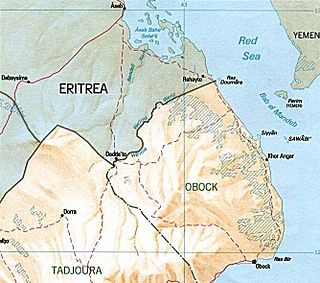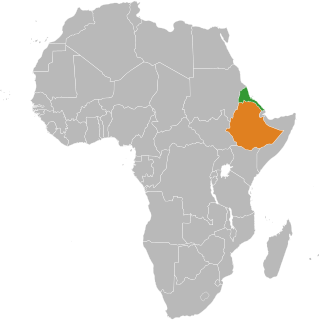"Eritrea" is an ancient name, associated in the past with its Greek form Erythraia, Ἐρυθραία, and its derived Latin form Erythræa. This name relates to that of the Red Sea, then called the Erythræan Sea, from the Greek for "red", ἐρυθρός, erythros. The Italians created the colony of Eritrea in the 19th century around Asmara, and named it with its current name. After World War II Eritrea was annexed to Ethiopia. In 1991 the Eritrean People's Liberation Front defeated the Ethiopian government. Tigray is a region of Ethiopia whose religions, food, language and culture are the same as that of the greater part of Eritrea. A lot of people have families on both sides of the border between Eritrea and Tigray. Eritrea officially celebrated its 1st anniversary of independence on May 24, 1991.

The politics of Ethiopia arise from the way the government of Ethiopia is structured as well as socioeconomic factors.

Many historians trace modern Ethiopia's foreign policy to the reign of Emperor Tewodros II, whose primary concerns were the security of Ethiopia's traditional borders, obtaining technology from Europe, and to a lesser degree Ethiopian rights to the monastery of Dar-es-Sultan in the city of Jerusalem. Tewodros' diplomatic efforts, however, ended disastrously with the British expedition of 1868 which concluded with his death. Despite the efforts of his successor Emperor Yohannes IV to establish a relationship with the United Kingdom, Ethiopia was ignored by the world powers until the opening of the Suez Canal, and more important, the Mahdist War, drew outside attention to her once more.

Dire Dawa is one of two chartered cities in Ethiopia. It is divided administratively into two woredas, the city proper and the non-urban woreda of Gurgura.

The Commercial Bank of Ethiopia (CBE) is the largest commercial bank in Ethiopia As of June 2015, it had about 303.6 billion Birr in assets and held approximately 67% of deposits and about 53% of all bank loans in the country. The bank has around 22,908 employees, who staff its headquarters and its over 1000+ branches positioned in the main cities and regional towns. The latter include 120 branches in the national capital Addis Ababa. With the opening of a branch in the Gechi in the Illubabor Zone of the Oromia Region, CBE's banking network has reached online 783 branches. The bank has reached 1284 branches as of August 10, 2018.

Law enforcement in Ethiopia is dealt with by the Ethiopian Federal Police at federal level and by regional police commissions in the Regions of Ethiopia. The Ethiopian Federal Police (EFP) was established in 1995 to serve the public, to ensure the observation of human and democratic rights and to maintain the safety and welfare of the public. Its stated duties are the enforcement of laws and safeguarding constitutional guarantees, the prevention, detection and investigation of crime, the coordination of national state police commissions and development of national policing standards. The EFP also has to provide operational support to regional police commissions.
However, local militias also provide local security largely independent of the police and the Ethiopian military. Corruption is a perennial problem, particularly among traffic police who solicited bribes.
The U.S. Department of State states that its contacts within the Ethiopian government report that the findings of investigations into abuses by local security forces, such as arbitrary detentions and beatings of civilians, are rarely made public. However, the Ethiopian government continued its efforts to train police and army recruits in human rights. During 2008 the government is seeking assistance from the International Committee of the Red Cross, the local non-governmental organization Prison Fellowship Ethiopia (JFA-PFE), and the Ethiopian Human Rights Commission to improve and professionalize its human rights training and curriculum. The JFA-PFE provided human rights training for police commissioners and members of the militia in 2008.

The Djiboutian–Eritrean border conflict between the forces of Djibouti and Eritrea occurred between June 10 and June 13, 2008. It was triggered by tension which began on April 16, 2008, when Djibouti reported that Eritrean armed forces had penetrated into Djibouti and dug trenches on both sides of the border. The crisis deepened when armed clashes broke out between the two armed forces in the border area on June 10, 2008. During the conflict, France provided logistical, medical and intelligence support to Djibouti, but did not participate in direct combat.

Ethiopia–Israel relations are foreign relations between Ethiopia and Israel. Both countries re-established diplomatic relations in 1992. Ethiopia has an embassy in Tel Aviv; the ambassador is also accredited to the Holy See, Greece and Cyprus. Israel has an embassy in Addis Ababa; the ambassador is also accredited to Rwanda and Burundi. Israel has been one of Ethiopia's most reliable suppliers of military assistance, supporting different Ethiopian governments during the Eritrean War of Independence.

Italians of Ethiopia are the immigrants from Italy who moved to live in Ethiopia as far back as the 19th century, and their descendants. King Menelik II did not allow the sale of lands belonging to Ethiopia to Italians (Eritrea) and probably allowed France (Djibouti) to solidify his centralized power and have external trading partners. Most of the Italians moved to Ethiopia after the Italian conquest of Abyssinia in 1936. Italian Ethiopia was made of Harrar, Galla-Sidamo, Amhara and Scioa Governorates in summer 1936 and became a part of the Italian colony Italian East Africa, with capital Addis Abeba and with Victor Emmanuel III proclaiming himself Emperor of Ethiopia.

Italian Ethiopia was a colony of the Kingdom of Italy located in East Africa, in the territory of present-day Ethiopia. It was proclaimed in 1936 following the second Italo-Ethiopian War, in which the Ethiopian Empire was occupied by Italy and became a part of the Italian colony Italian East Africa, with capital Addis Abeba and Victor Emmanuel III proclaiming himself Emperor of Ethiopia..

Visitors to Ethiopia must obtain a visa from one of the Ethiopian diplomatic missions unless they come from one of the visa exempt countries or countries whose citizens are eligible to apply for an electronic visa or visa on arrival.

The Royal Corps of Somali Colonial Troops was the colonial body of the Royal Italian Army based in Italian Somaliland, in present-day northeastern, central and southern Somalia.
The following lists events that happened during 2016 in Ethiopia.
The following lists events that happened during 2005 in Ethiopia.

Abiy Ahmed Ali is an Ethiopian politician serving as the 15th and current Prime Minister of Ethiopia since 2 April 2018. He is chairman of both the ruling EPRDF and the ODP, which are one of the four coalition parties of the EPRDF. Abiy is also an elected member of the Ethiopian parliament, and a member of the ODP and EPRDF executive committees.

Relations between Eritrea and Ethiopia are historically adversarial. Immediately after Eritrea's independence from Ethiopia in 1993, relations were cordial despite the former relationship. Since independence Eritrea's relationship with Ethiopia was entirely political, especially in the resuscitation and expansion of IGAD's scope. Since 1998 and the Eritrean–Ethiopian War, the relationship became increasingly hostile. Ties were reestablished on 9 July 2018 leading to new improved relations.
The 2018 Eritrea–Ethiopia summit was a bilateral summit that took place on 8–9 July 2018 in Asmara, Eritrea, between Eritrean President Isaias Afwerki and Ethiopian Prime Minister Abiy Ahmed and officials from the two countries.


















